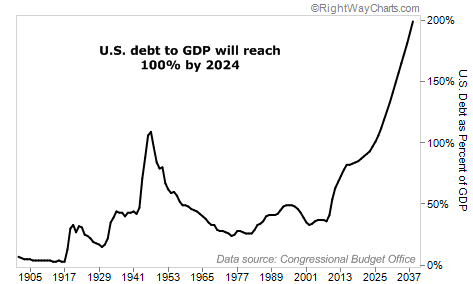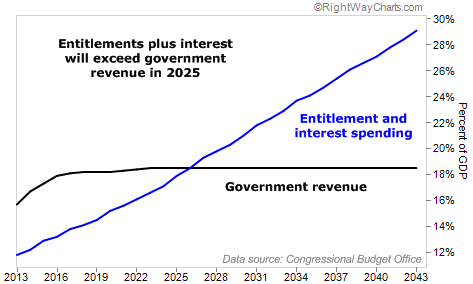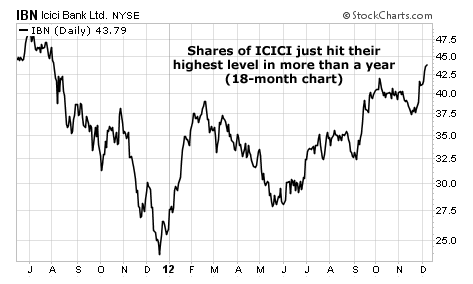| Home | About Us | Resources | Archive | Free Reports | Market Window |
Why U.S. Unemployment Could Triple from HereBy
Tuesday, December 11, 2012
The unemployment rate in Spain just hit 26%, barely topping Greece.
Not to be outdone, Greece's largest labor union predicts it will rise to 29% next year.
In Spain, the unemployment rate for those under age 25 is 56%. In Greece, it's 57%. What happens when you have hundreds of thousands of unemployed youths? They protest... sometimes violently.
Could the U.S. end up like Greece and Spain? Unfortunately, the answer is yes.
How does a country end up with high unemployment? It's Economics 101...
When you run up big debts that you can't afford, the borrowing costs in your country go up. Studies show that higher debt loads are a drag on economic growth. Higher borrowing costs and lower economic growth lead to higher unemployment.
You can see it happening around the world:
Spain's debt-to-GDP (gross domestic product) ratio should end 2012 at 85%. By comparison, the official federal debt-to-GDP ratio in the U.S. is currently 72%.
The thing is, it is not the current level of debt that is the concern in the U.S. – it's the trajectory.
 The Congressional Budget Office (CBO) predicts the U.S. federal government debt will reach 100% of GDP by 2025 and 200% of GDP by 2037. (You can see its assumptions here.)
So where did Greece and Spain go wrong? And can we avoid making those mistakes here?
Simply, the Greek and the Spanish governments made unsustainable promises to their people. And they rang up huge debts to pay for those promises. The weight of these debts forced economic growth to fall, which led to higher unemployment.
Unfortunately, in the U.S., we are doing exactly the same thing...
Our government has promised to pay for "entitlements" – programs like Social Security and Medicare/Medicaid. But they are unsustainable in their current form. In order for these benefits to exist at all for future generations, the programs need to be reformed.
To show you what I mean, consider this chart:
 It shows that spending on just these entitlements (plus the interest on the national debt) will eat up ALL the government's revenue by 2025. Once again, it is the trajectory that is the problem.
The spending on entitlements (and the interest on our national debt to pay for these entitlements) will continue to soar. (These estimates also come from the CBO.)
Politicians are deathly afraid to reform entitlements. They know if they vote in favor of entitlement reform – even if it is to ensure they continue for future generations – they will lose their re-election bid.
But entitlement reform has to happen – or the U.S. will end up like Greece and Spain, with low growth and high unemployment.
Politicians are talking around the issue these days. They're talking about increasing revenues through taxes... and cutting spending on different programs. But all that talk is a waste of breath.
Let your Congressmen know you don't want to end up like Greece... that you don't want a broke government and riots in the streets because the government can't fulfill its promises.
Let your Congressmen know that you are behind them... that they have your vote if they do the hard-but-right thing with entitlements.
We can't avoid the issue any longer.
The easiest way to contact your Congressmen is to type your zip code into this website. It takes you to the contact forms for all your Congressmen.
Do it... Let's not end up like Spain and Greece...
Regards,
Steve
Further Reading:
The situation in Greece and Spain is dire. But as legendary contrarian Marc Faber believes – and Steve agrees – it does create excellent investment opportunities. In June, Steve recommended a one-click fund to profit off the economic troubles in Europe. Today, it's up 25%... while the S&P 500 has gone essentially nowhere. Read more here: Why the "Gloom and Doom" Man Is Actually BUYING European Stocks.
Market NotesA BULLISH BREAKOUT FROM AN INDIAN BELLWETHER One of India's biggest banks just gave investors another reason to be bullish on the high-upside emerging economy.
India offers some of the biggest long-term potential in the market. Despite having the world's second-most populous country, India's economy is just 10th in the world – half the size of Germany's. In other words, there's plenty of room for growth.
Last week, Steve pointed out Indian stocks surged 658% between 2002 and 2007. But in the last two years, the country's economy has fallen to its slowest pace in a decade. That has held stocks back.
"Large Indian stocks have fallen 41% from peak to trough," Steve explained, "and they've bounced along those lows all year."
But today's chart is another sign the trend is turning... ICICI (IBN) is India's second-largest bank. Besides its massive network of branches and ATMs, the bank provides loans to people and businesses across India. ICICI's latest results showed 20%-plus growth in areas like auto loans and commercial business loans.
Last week, shares of ICICI just broke out to their highest level in more than a year. Given the company's critical role in India's financial system, the recent breakout is an important sign that the country's economy is improving.
– Larsen Kusick
 |
In The Daily Crux
Recent Articles
|


